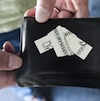Designing financial services for the poor
“We seek to create a community of practice and inquiry into the everyday uses and meanings of money, as well as examining the technological infrastructures being developed as carriers of mainstream and alternative currencies worldwide.
Money costs money for people who are extremely poor and who have limited or no access to banks or credit. For many of the world’s poor, fees for financial services and transactions seriously limit their ability to use or share what little money they have. People have long taken whatever is ready-to-hand to serve the functions of money, from livestock to jewelry, and have used different relationships and objects to help them save, store, and transfer wealth. Today, new communications technologies are being added to this complex ecology of money. This ranges from sharing airtime minutes as an alternative currency, to using mobile phones and point-of-sale terminals for accessing banking institutions, or even as independent systems for saving, storing and transferring wealth.”
The 2010 Annual Report discusses IMTFI’s research in 2008-09 and presents 11 design principles on the creation and implementation of saving services for the poor.




